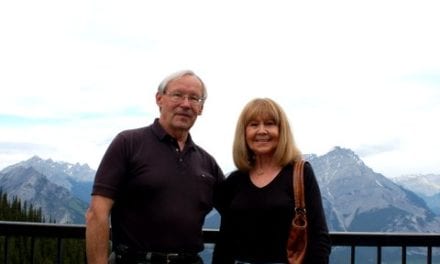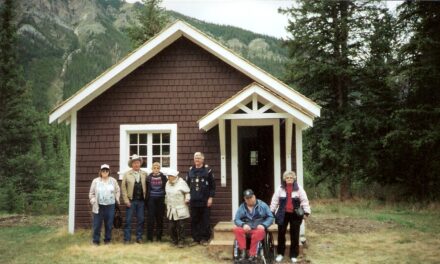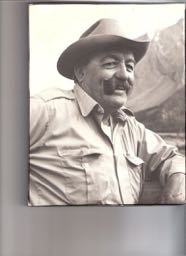“Do you have any lasting memories as a warden, a favorite place etc?”
(1:03:58) Favorite place, favorite highlight of my career was Pacific Rim, because it was so different and such a spiritual place. There is some kind of a vibe out there that totally gets into your soul. And the Pacific Ocean and the wilderness out there, the whales, the eagles, the virgin forests, the marine life, the surfing. And I made some really good friends. A guy I really admired out there was a guy by the name of Doug Palfrey who was a surf guard there, an incredible water man. Another really good friend of mine was Ted Goodspeed. He was a surf guard, he got killed in a car accident, but he was an incredible surfer and water man. He taught me a lot about surfing out there. Then after that I would say the dog handler job and the backcountry stuff. It was a pretty versatile career. Now it is doing music with a band called ‘The Wardens.’ We travel all over Alberta getting paid decent bucks to sing about it. It is a good interpretive program that we put on. It is a mix and we intertwine it with music, all our own music. Yeah we’ve had a lot of fun with it. The first summer we did 40 gigs and last summer we did 30. This winter we are already busy. We did one last week and we’ve got one coming up June 13 by Millarville. We’ve got one coming up at the Banff Center at the end of January and we’ve got one coming up at Innisfail in February. There is another one in Cochrane in April, the “Spring is in the Air” art festival. And we did the Canmore Folk Festival two years in a row. It’s catching on. We just cut our first CD, it will be ready in about another month. A guy named Leeroy Stagger, he is a music producer. We recorded it down in Lethbridge.
“I hear you are writing a song about Dorothy (Carleton)?”
(1:06:34) Well, Cori Brewster and I are working on one. (Dorothy Carleton was married to Banff park warden Ed Carleton. She is a war bride from England who came to Canada in 1946. For many years she and Ed and their three boys lived in the backcountry districts of Banff national park. At age 94 she is a very well loved and active member of the Banff community.) I wrote my part and Cori has been kicking at it. A friend of hers, Marie Dunne, is working on it too. With the three of us inputting it will be interesting to see how it turns out. Yeah, Cori and I went to Dorothy’s house and interviewed her. We had a great interview with her. So it’s been good.
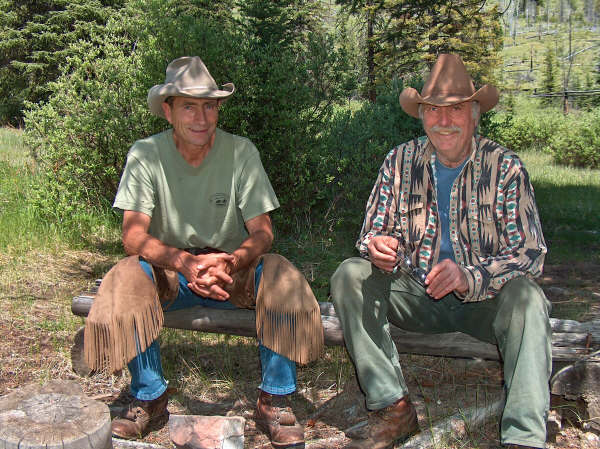
Scott and Don Mickle up the Cascade, Photo by Chuck O’Callahan.
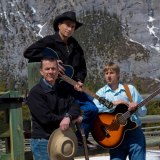
“The Wardens” Brad Bischoff, Scott Ward and Ray Schmidt
“Do you ever miss being a warden?”
(1:07:11) Yeah sometimes. I found when I retired I didn’t miss it during the day really because I was really enjoying what I was doing in retirement, but I would dream about it every night. Donny has the same thing. This recurring dream when we are back there again. You’re retired but you are still there. It was just kind of a weird dream. This reoccurring dream that I had for several years, it has finally gone away now. I wouldn’t say I really miss being a warden, but sometimes I miss being out in the backcountry with horses. If I really wanted to do it, I could still do it. I have gone for sort of like one trip a year since I retired. Ron Warner really wanted me to go working for him after I retired. (Ron Warner is a local Banff outfitter who owns Holiday on Horseback.) I could have gone and done that, but I had sort of had enough by that point. Like I didn’t really want to ride around with a bunch of dudes and look at the same country that I had been looking at for 35 years. It is beautiful out there and it is great, but I would rather just go with Donny and make it a trip and do other things.
“You have also done a fair bit of travelling.”
Yeah we’ve done a lot of travelling. All over Southeast Asia, Australia, New Zealand, South America.
Do you still ski a lot?
Pretty much every day. I ski everyday in the winter and I do a lot of hiking in the summer and mountain biking. My two sons are both living here and they are really active too. I go alpine touring with Trevor. Roddy is a national team coach for biathlon. I’ve spent the last quite a few years coaching kids in biathlon and I also teach skate ski classes for the Canmore Nordic ski club. So I am involved in the ski club quite a bit. Between music, the ski club and doing outdoor pursuits, I have never been bored for a minute and I haven’t really had time to miss work. If they said to me tomorrow, do you want to come back and work as a warden for a summer I would say “no”. Even if it was straight backcountry I would say “no” because I am doing too many other things that interest me at this point in my life. Backcountry is the greatest job in the world but like anything if you overdose on it, it is not what it was the first five years you did it.
“Is there anything that you would like to add?”
(1:10:40) Maybe just about the dog calls I guess. There was a huge amount of different dog calls, tons of good successes. Tracking successes where we virtually found hundreds of thousands of dollars worth of drugs for the RCMP squirreled away in various locations like people’s houses and cars things like that. Tracking is the most exciting part, catching somebody on a track is the most gratifying thing. I think the success rate for police dogs is right around 25%, so only one time in four you actually come up with a result. Three quarters of the time there is nothing to find, a guy gets away on the track. So that is why you have to train, train, train with your dog and keep it positive. You learn to take the non successes in a more relaxed manner after you have been doing it for a while. The first five years that you are a dog handler you are stressed every time that you are called out. You are trying so hard and you want to make a reputation for yourself and the dog. You go out and you try to track some guy down in the middle of the night and you didn’t catch him, you come home and toss and turn in bed for hours thinking what you could have done different. After five years or so, you learn to just take it in stride and realize that you don’t always catch people. You learn to just shut it off. You see the same situations again and again and you get more confidence and you know what you can do and what you can’t do. You get more realistic in your expectations of your dog as opposed to when you are training it with the RCMP and everything is set up for success. You come out of there figuring that you are just going to catch the world. Then reality hits when you don’t. You can sometimes get ten calls in a row with no success. Then you will get the big success and you are totally high on that for a few days. It is a difficult job, it is a really hard job. You are away from home a lot when you are training and when you are training you never know if you are going to get out with that dog or not. Only one dog in four in our days made it through the training course because so much is expected of the dogs. You can have the most cracker jack dog in the world and two months into training your dog just quits working. He loses interest or he won’t do this or he won’t do that. You can him and you start from day one again. One guy was there a year and a half trying to train a dog. He kept going through six dogs before he got out of there. I went through three dogs my first time before I got out. So it is a course of a lot of highs and lows. Some days you are totally up, “Okay this dog is going to work, that was great.” And the next day, “Ah crap, they are going to shoot him down any day now.” It just goes on and on like this. You have to totally learn to take it in stride and day by day. Just enjoy the process of training a dog and not worry about how long it takes to get out. Some guys had big pressure at home to get back. I should have had that pressure, because Wanda was home with three little kids, but she never put that pressure on me. So I never had to worry, “Is this going to take six months or a year?” I never felt that pressure from her. I was really, really lucky because I saw a lot of other dog handlers had that pressure.
“I also read that you got a Governor General award.” (In 2006 Scott received the Governor General’s Peace Officer’s Exemplary Service Medal.)
(1:14:30) Yeah that was pretty cool. That was for exemplary service as a peace officer. I think when I look back on my career I was one of the few guys that spent 35 years completely at field level the whole time. The general average is around ten years at field level and then they would either go to a different job with Parks or they would go up the ladder and become supervisors or chief wardens, or they would become specialists in one form or another. So there wasn’t that many who really stayed at field level for that period of time. I think that is one of the reasons I got the award and the danger of the dog handling job. The criteria was you had to have ten years at field level in a stressful situation, whereas I had my whole career. Seventeen of them were in very stressful situations. The dog handler job was a very dangerous job. Two of my close friends who were RCMP dog handlers that I trained with were shot and killed doing that job. So when you add the elements of avalanche searching…and it is too dangerous to put a rescue crew in, the dog goes on with you. You risk one person instead of 20. So you are taking that risk all the time on top of the fact that you are taking the risk of tracking these guys down in the middle of the night. You don’t know if they are armed, you don’t know why they are running from the cops or who they are. In this day and age it is very dangerous. That is how two of my friends were killed. You add all those elements to the Dog Master job it is considered by the RCMP to be the most hazardous job…then you add the public safety stuff on top of that, it is a dangerous job.
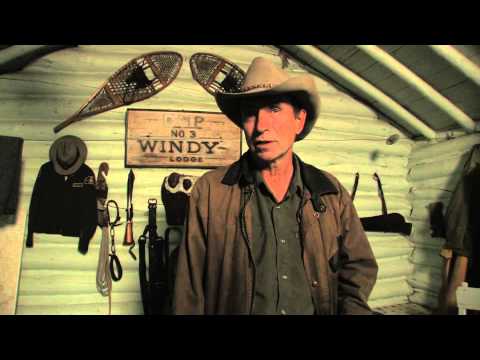
Retired Warden Scott Ward Telling Stories at the Windy Cabin on the grounds of the Whyte Museum of the Canadian Rockies in Banff Alberta.
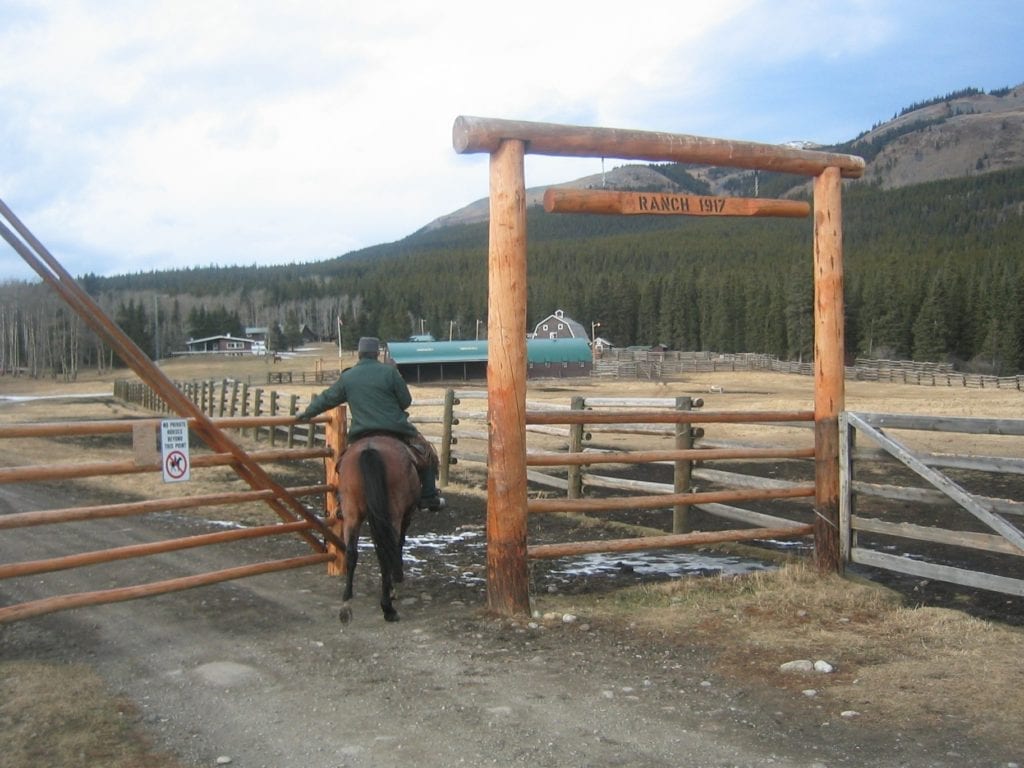
Scott Ward – Ya Ha Tinda bound.
